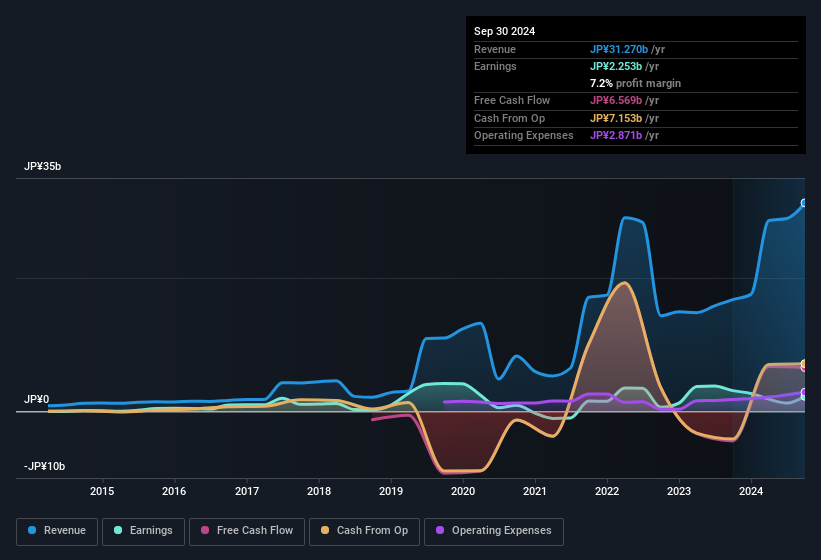The latest earnings report from Wealth Management, Inc. (TSE:3772 ) disappointed investors. We did some digging and believe that things are better than they seem due to some encouraging factors.
View our latest analysis for Wealth Management

Zooming In On Wealth Management's Earnings
In high finance, the key ratio used to measure how well a company converts reported profits into free cash flow (FCF) is the accrual ratio (from cashflow). The accrual ratio subtracts the FCF from the profit for a given period, and divides the result by the average operating assets of the company over that time. This ratio tells us how much of a company's profit is not backed by free cashflow.
That means a negative accrual ratio is a good thing, because it shows that the company is bringing in more free cash flow than its profit would suggest. That is not intended to imply we should worry about a positive accrual ratio, but it's worth noting where the accrual ratio is rather high. That's because some academic studies have suggested that high accruals ratios tend to lead to lower profit or less profit growth.
For the year to September 2024, Wealth Management had an accrual ratio of -0.11. Therefore, its statutory earnings were quite a lot less than its free cashflow. Indeed, in the last twelve months it reported free cash flow of JP¥6.6b, well over the JP¥2.25b it reported in profit. Notably, Wealth Management had negative free cash flow last year, so the JP¥6.6b it produced this year was a welcome improvement. However, that's not all there is to consider. We can see that unusual items have impacted its statutory profit, and therefore the accrual ratio.
Note: we always recommend investors check balance sheet strength. Click here to be taken to our balance sheet analysis of Wealth Management.
The Impact Of Unusual Items On Profit
Surprisingly, given Wealth Management's accrual ratio implied strong cash conversion, its paper profit was actually boosted by JP¥409m in unusual items. While it's always nice to have higher profit, a large contribution from unusual items sometimes dampens our enthusiasm. When we crunched the numbers on thousands of publicly listed companies, we found that a boost from unusual items in a given year is often not repeated the next year. And that's as you'd expect, given these boosts are described as 'unusual'. If Wealth Management doesn't see that contribution repeat, then all else being equal we'd expect its profit to drop over the current year.
Our Take On Wealth Management's Profit Performance
In conclusion, Wealth Management's accrual ratio suggests its statutory earnings are of good quality, but on the other hand the profits were boosted by unusual items. Based on these factors, it's hard to tell if Wealth Management's profits are a reasonable reflection of its underlying profitability. If you'd like to know more about Wealth Management as a business, it's important to be aware of any risks it's facing. Every company has risks, and we've spotted 2 warning signs for Wealth Management you should know about.
In this article we've looked at a number of factors that can impair the utility of profit numbers, as a guide to a business. But there are plenty of other ways to inform your opinion of a company. Some people consider a high return on equity to be a good sign of a quality business. While it might take a little research on your behalf, you may find this free collection of companies boasting high return on equity, or this list of stocks with significant insider holdings to be useful.
Valuation is complex, but we're here to simplify it.
Discover if Wealth Management might be undervalued or overvalued with our detailed analysis, featuring fair value estimates, potential risks, dividends, insider trades, and its financial condition.
Access Free AnalysisHave feedback on this article? Concerned about the content? Get in touch with us directly. Alternatively, email editorial-team (at) simplywallst.com.
This article by Simply Wall St is general in nature. We provide commentary based on historical data and analyst forecasts only using an unbiased methodology and our articles are not intended to be financial advice. It does not constitute a recommendation to buy or sell any stock, and does not take account of your objectives, or your financial situation. We aim to bring you long-term focused analysis driven by fundamental data. Note that our analysis may not factor in the latest price-sensitive company announcements or qualitative material. Simply Wall St has no position in any stocks mentioned.
About TSE:3772
Proven track record with mediocre balance sheet.
Market Insights
Community Narratives



